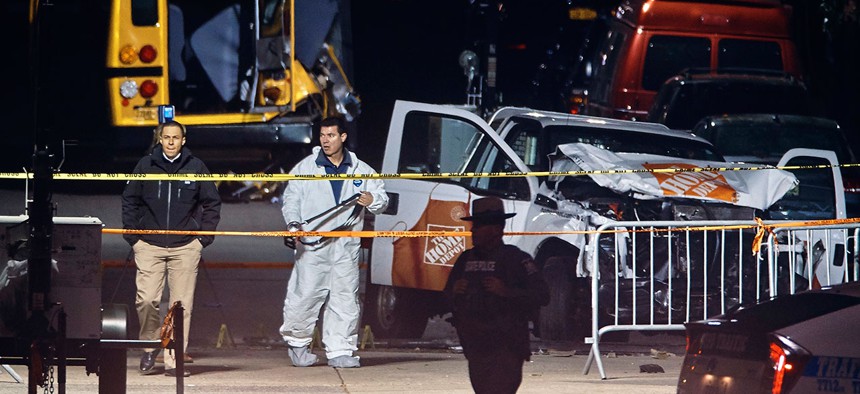The Attack in Manhattan Poses a Test for Donald Trump
The president was notably restrained in the wake of an apparent terror attack on Tuesday—that hasn’t often been the case.
Give credit where credit is due. President Donald Trump’s first response to Tuesday’s deadly attacks in New York City was fine. “In NYC, looks like another attack by a very sick and deranged person,” Trump tweeted. “Law enforcement is following this closely. NOT IN THE U.S.A.!” Sure, it’s weird to declare “NOT IN THE U.S.A.!” after an attack has just occurred in the U.S.A. But Trump didn’t incite hatred and he didn’t lie. His second and third tweets were comparatively mild too.
Can he keep it up? It’s unlikely Trump will stay silent. When the terrorists aren’t Muslim, he’s quite capable of holding his tongue. He said nothing about the six people killed at mosque in Quebec City in January. He was similarly quiet when an African American man was stabbed in a racially motivated attack in New York in March, and when a white supremacist stabbed another African American man in College Park, Maryland, in May. He took six days to address the murder of an Indian American outside Kansas City in February and three after a white supremacist murdered two people on a Portland, Oregon, train in May.
But when the killers are Muslim, Trump grows voluble. And his theme is usually: Muslims have too many rights. After an attack in Paris in November 2015, he toldMSNBC that if elected, he’d “strongly consider” closing mosques. That December, after the terrorist attack in San Bernardino, he proposed a temporary ban on Muslim immigration to the United States. The following June, after Omar Mateen killed 49 people at an Orlando nightclub, Trump calledthe Obama administration’s plan to admit Syrian refugees a “better, bigger, more horrible version than the legendary Trojan Horse ever was.” He also claimed that American “Muslims … know what’s going on. They know that he was bad. They knew the people in San Bernardino were bad. But you know what? They didn’t turn them in.”
It’s been much the same since Trump became president. After an attack in London this June, he declared that “We need the courts to give us back our rights. We need the Travel Ban [on seven majority-Muslim countries] as an extra level of safety!” When terrorists struck Barcelona in August, he urged Americans to “Study what General Pershing of the United States did to terrorists when caught.” In other words, murder Muslim prisoners while desecrating their religion. (Although Pershing didn’t actually do that.)
Why is it so hard for Trump to stick to the expressions of sadness and resolve that previous presidents deployed after terrorists struck? For starters, such expressions are dull, and Trump rarely misses an opportunity to claim the spotlight. Secondly, they’re aimed at reducing fear whereas Trump thrives on stoking it, especially against people who aren’t Christian or white. The Paris and San Bernardino attacks—and Trump’s incendiary responses to them—boostedhim in the polls. Finally, bland statements of solidarity and concern don’t deflect responsibility, which Trump does almost instinctively. Scared people are likely to blame the people who aren’t keeping them safe. As a candidate, Trump focused that blame on Obama and Hillary Clinton. Since then, he’s blamed the courts, the mayor of London, Scotland Yard, and people who are “politically correct.”
In the wake of Tuesday’s attack in New York, he could again go after the judges who are impeding his travel ban. But an even easier target would be the mayor of New York. Trump’s anti-Muslim allies are already attacking Bill de Blasio for not “monitoring radical mosques.” For now, he’s not following their lead. But if that line of argument hits Fox and Friends, will Trump be able to resist?




